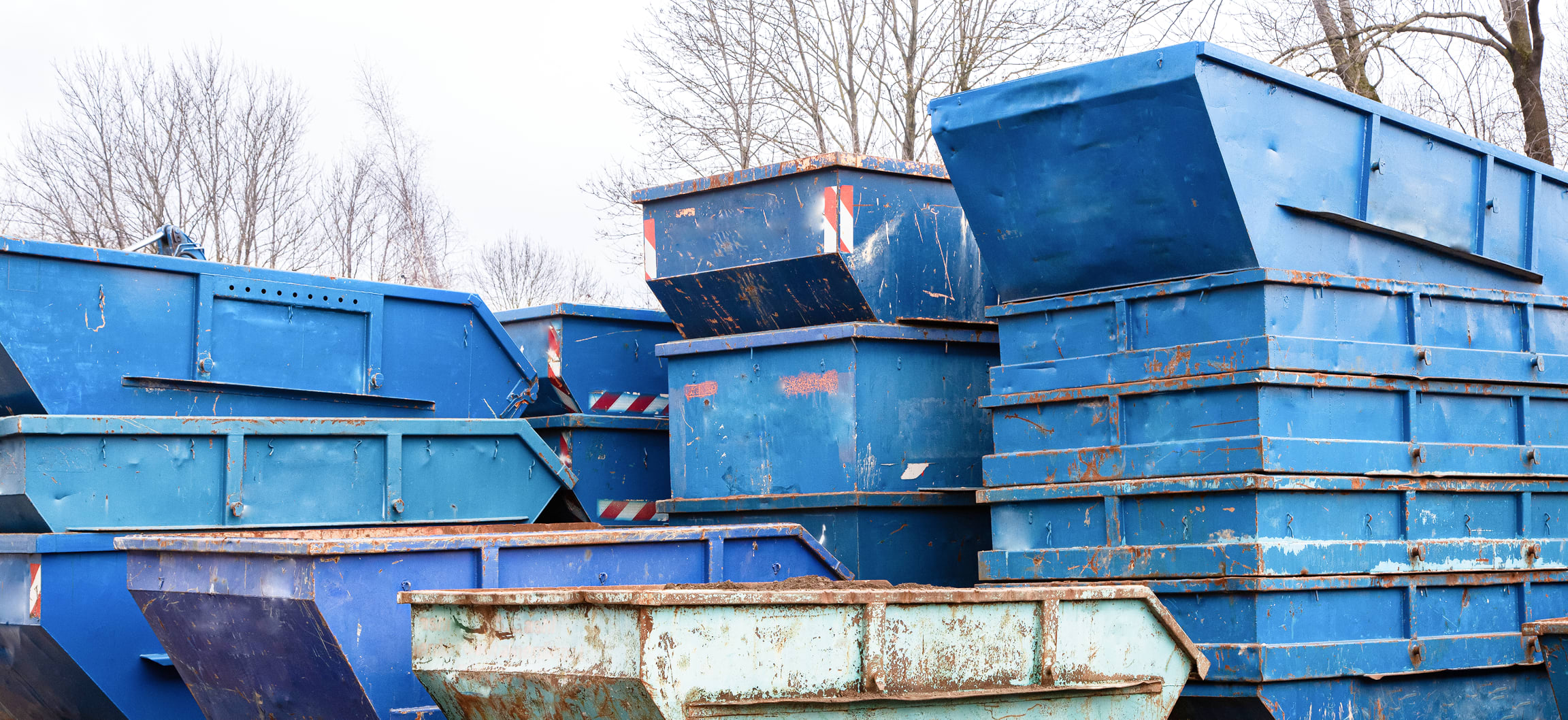
- Industries
Contact sales
Our software caters to all the verticles of equipment rental businesses. Have other plans? Share yours.
 Chat with us
Chat with us - Marketing Strategy
- SEO Guide
- Blog
Contact sales
Our software caters to all the verticles of equipment rental businesses. Have other plans? Share yours.
 Chat with us
Chat with usComplete guide to starting a dumpster rental business
Inside the article
Request a product demo
Get a demo and clarify your doubts about our software.
Ever notice those big dumpsters at construction sites and think if there's a business opportunity there?
If you have a similar thought, here’s some promising data for you.
Dumpster rental has grown into a $1.1 billion industry in 2023 and is projected to nearly double by 2033.
The best part? Startup costs are relatively modest compared to the earning potential.
You can start with one truck and a few dumpsters and scale up as you grow.
The fundamentals are similar whether you're in North America, Europe, Asia, or anywhere else.
Let’s see how you can start a rental business, more importantly—a dumpster rental.
Step 1: Research the dumpster rental market
1. Identify your target customers
Think about who is likely to rent dumpsters. They are your possible customers.
Your target audience can be homeowners, contractors, builders, businesses, organizers, or municipalities.
Consider which of these people are active in your region.
The customer research is not just about identifying. Dive deeper and analyse their wants, pain points, and income group.
2. Study the competition and be prepared
Recognize existing dumpster rental companies in your area.
Ask this: How many businesses are out there, and what dumpster types do they offer?
Look at their dumpster sizes, prices, and reviews. This can reveal market gaps or underserved niches.
Besides that, learn more about their pricing and policy on their websites or call for quotes.
3. Find your niche
Based on your research, think about how you can stand out.
If the environmental regulations are strict in your country, so a service that emphasizes recycling and proper disposal could work.
One entrepreneur turned this concern of regulations into a working solution.
He noticed that none of the dumpster providers offered recycling sorting. So he launched a dumpster service that separates recyclable materials from trash.
This appeals both to the government and customers.
Step 2: Navigating the legal requirements
Starting a dumpster rental business might look like a walk in the park. But it is not until you cover the legal aspects.
The legal requirements for a dumpster rental business vary from country to country and region.
Let’s go through one by one.
1. Business registration and structure
First, register your business with the appropriate authorities.
Choose a business name (make sure it's not already taken) and decide on a legal structure.
Many small businesses start as an LLC (Limited Liability Company) or equivalent, which protects your assets and is relatively simple to set up.
In some countries, you might register as a sole proprietor or partnership initially, but be aware that this could make you personally liable for any business issues.
Consult a local business bureau or advisor on the best structure and get the necessary paperwork done.
2. Waste handling permits/licenses
In the United States and Canada
Typically, you'll need a general business license for your city/county, plus possibly a waste transporter permit or environmental permit if required by state/province.
Do check with your state/provincial environmental agency or local waste management authority.
In the UK and European countries
Here, the regulations are often stricter. For example, in the UK, you must obtain a Waste Carriers License from the Environment Agency to transport waste legally.
This registers you as an authorized waste transporter.
If you plan to store or sort waste on your property, you might also need a permit for a waste transfer station or yard.
Additionally, placing a dumpster on a public road in the UK requires a permit from the local council and adherence to safety rules.
In the EU countries
EU countries have similar rules.
Be prepared to apply for waste transport registrations and follow directives on proper disposal and recycling.
In other regions (Asia, Africa, Latin America), rules vary widely.
Some cities may require a municipal permit or contract to operate a private waste service; others might have less formal processes.
Always start by inquiring with your city government or environmental ministry to see what permits or licenses are needed.
3. Environmental regulations
Wherever you are, you need to follow the laws on what can and cannot be thrown in a dumpster.
Typically, things like liquids, chemicals, batteries, asbestos, tires, or other hazardous materials are prohibited or require special handling.
You should familiarize yourself with these rules.
Many regions also have recycling laws. So always dispose of waste at licensed facilities.
If you get caught dumping waste illegally or mixing forbidden items, it can result in heavy fines or even shutdowns.
4. Insurance
Protecting your rental business with insurance is not just smart—in some cases, it's required.
At minimum, get a general liability insurance to cover accidents and commercial auto insurance for your truck.
If you have employees working for you, most countries require workers’ compensation insurance, as well.
Insurance costs can vary, but plan for a few thousand dollars per year for a basic coverage package.
In summary, getting all your paperwork ducks in a row can seem like a hassle upfront, but operating legally and responsibly saves you from costly headaches later.
Step 3: Choosing the right dumpsters and vehicles
The equipment is the workhorse of your business. Here are some tips for making the right choices:
1. There are different dumpster types and sizes
As mentioned, dumpsters come in multiple sizes. Some common dumpster sizes include,
Small (4-10 cubic yards)
Good for residential cleanouts, small renovation debris, yard waste, etc.
These are easier to place in tight driveways or urban areas.
Medium (15-20 cubic yards)
Ideal for moderate remodels, roofing projects (old shingles), and medium construction jobs.
A 20-yard dumpster is often considered a versatile size.
It is big enough for a lot of debris but not so large that it won’t fit in a suburban driveway.
Large (30-40 cubic yards)
These handle major construction, demolition, or commercial cleanouts.
They hold a huge volume of waste (equivalent to about 12+ pickup truck loads). However, they are heavy when full and require more space to drop off.
Which dumpster size to consider?
You can start with the mid-range (15 or 20 yd) and one larger (30 yd) and one smaller (10 yd), to cover a variety of requests.
2. Quality and durability
Dumpsters take a lot of abuse, such as heavy materials dumped in, exposure to weather, and being dragged on and off trucks.
It's usually worth buying decent-quality bins that will last.
How to point out the best dumpster?
You can look for features like thick steel walls, reinforced corners, and good paint/coating to prevent rust.
Some cheaper ones might have thinner metal that can dent or puncture more easily.
A well-built dumpster can last many years.
3. Choose the truck and vehicle
1. Roll-off truck
This has a tilting bed with a winch and rail system.
The dumpster rolls on and off on wheels. It's very common in North America.
Roll-off trucks typically handle the larger dumpster sizes (10+ yards).
2. Hook-lift truck
Similar concept, but uses a big hydraulic hook to grab a loop on the container and pull it up.
Hook-lift trucks can be versatile, sometimes picking up other attachments too.
These are used in various countries.
3. Chain lift truck
Often seen in Europe/UK for skips.
Uses chains to lift the skip up onto the truck.
These trucks often carry smaller skips (like two 4-yard skips at once, or one larger skip).
Step 4: Setting the pricing strategy
Pricing strategy for your rental business can make or break your business.
Charge too high and customers flee to competitors; charge too low and you might lose money or appear "too good to be true."
Crafting your pricing strategy involves understanding your costs, the local market rates, and how customers perceive value.
Let’s see how you can approach this:
Calculate your operating costs
1. Disposal fees
What does the landfill or transfer station charge you to dump a full load?
Many facilities charge per weight (e.g., per ton) or per load. This can vary a lot by region.
For example, landfill fees might be $50/ton in some areas, but over $100/ton in others.
If you have a 2-ton load of debris, that's a direct expense you'll pay.
2. Transportation cost
Fuel for the truck, plus wear and tear.
Some folks use a per-mile cost estimation for their truck.
Also include driver labor time. If you're the driver, that's your time; if you hire a driver, it's their wage.
3. Overhead
A small portion of your fixed costs should be allocated to each rental, such as insurance, truck payments, etc.
For simplicity, you might say, "I need at least $X per rental to cover my overhead".
When you know roughly what a job "costs" you (say, for example, $200 between dump fees, fuel, and overhead for a local 1-week rental), you can then add a profit margin to set your price.
Set your base package
A common approach is to offer a standard rental package – e.g., "7-day rental of X-size dumpster, includes delivery, pickup, and disposal of up to Y tons of waste."
You can have different packages for different sizes.
Additional fees
Be transparent about any extra fees.
Your customers hate surprise surcharges.
When can you charge additional?
- You can charge more for the excess weight.
- You can charge more if they keep the dumpster longer than the included period.
- You can charge more if you deliver or pick up the dumpster.
- You can charge more if they throw in tires, appliances, or hazardous items that you must handle separately.
Make pricing easy to understand
Most businesses often have confused pricing or unexpected charges.
That’s why your pricing has to be simple and clear.
Showcase your rates on your website or easily provide quotes.
At start, you may set prices and then realize you need to tweak them. Yes, it’s okay to adjust pricing as you learn.
Examples of pricing
Let's illustrate with an example in USD:
- 10-yard dumpster, 3-day rental, up to 1 ton of waste: $250.
- 20-yard dumpster, 7-day rental, up to 2 tons: $400.
- 30-yard dumpster, 7-day rental, up to 3 tons: $500.
- Extra days: $20/day, Extra weight: $75/ton.
Step 5: Market your dumpster rental business
You have a truck, dumpsters, permits, and pricing ready. Now you need actual customers!
Marketing your rental business is how you get the word out about your business and give life to your brand.
Since your business could be targeting the local audience, a mix of online and offline marketing is what you have to consider.
Let's break down strategies:
Create an online presence
The website is the foundation
- An overview of your services and dumpster sizes.
- Your service area (cities/regions you cover).
- Clear contact information (phone and email) and ideally an online booking request or quote form.
- Your pricing or a way to get a quote easily.
- Possibly, there should be an FAQ section to clarify all their queries.
- Some customer testimonials.
SEO (Search engine optimization)
This means making your website appear when people search via a search engine like Google.
SEO for your rental business can refer to employing multiple strategies.
Yet, those multiple strategies can take time; but once done right, it can be rewarding.
To do SEO, you can hire a professional, work with agencies, or do it yourself.
Google Business Profile
Create local visibility on Google Maps and local search by creating and optimizing your Google Business Profile.
Set this up as soon as you have a business name and phone number!
Include your business address, hours, service description, and photos of your equipment.
After acquiring customers through this strategy, ask them to leave a Google review. That can boost the trust and credibility.
Also, focus on traditional marketing efforts
Feeling clueless on where to start. Look out for the competitors and identify the traditional strategies employed by them.
Because the strategy they run for them could work for you, too.
Implement those strategies and find whether they are working for you.
After all, marketing is about experimenting and enhancing.
Step 6: Managing logistics, scheduling, and customer service
Running a dumpster rental operation involves a lot of moving pieces, literally.
Efficient logistics and top-notch customer service will set you apart.
Let's discuss how to manage rental inventory and other business operations:
1. Scheduling and dispatching
You'll need a system to keep track of all your rentals.
If you have only a few dumpsters at the start, a simple spreadsheet or calendar will do the trick.
But as you grow, consider using dumpster rental software.
The software can prevent double-booking and streamline your dumpster rental operation. There are only the pros to using the equipment rental software.
2. Logistics and operations
Your day-to-day operations could involves:
- Each morning, check the day's itinerary. Ensure the truck is fueled and a pre-trip inspection is done.
- Load any empty dumpsters needed for deliveries onto the truck.
- Plan dump runs at efficient times. If you pick up two full dumpsters, maybe dump both on one trip if the truck can carry two small ones at once.
- Keep records of what was dumped, weights, etc. This is important for billing any overweight fees and keeping track of your monthly tonnage.
- Maintain your equipment proactively. Wash out dumpsters if they start smelling or have gunk. Some companies do quick cleanouts; others let rain and time do it.
- If you can, have a backup plan for your truck. What if it breaks down? Such scenarios are rare, but being prepared is part of good logistics.
3. Customer service excellence
Even though hauling trash is a "dirty job", customer service is where you can shine.
Guide them better!
What we mean by it?
Many contractors or homeowners don’t have previous experience with renting a dumpster, so guiding them can create a positive experience.
- Respond to their inquiries promptly.
- Answer friendly and professionally.
- Educate them about your key rules. This prevents problems later.
- Try to accommodate customer needs.
- Solve the concerns they have.
- Give a consistent update regarding the order.
End note
Starting a dumpster rental business may not be the most glamorous venture, but it has proven to be a vital service in communities around the world.
When you start, it’s normal to feel a bit overwhelmed. But take one step at a time. As you book your first few jobs, you'll eventually gain confidence and insight.
Surely, there are challenges for you, like any other business, such as early mornings, heavy lifting, and the occasional stubborn client. But it also comes with the reward of building something of your own.
So, gear up and get ready to roll!
Request a product demo
Get a demo and clarify your doubts about our software.





